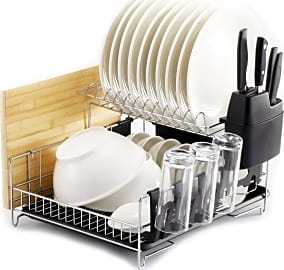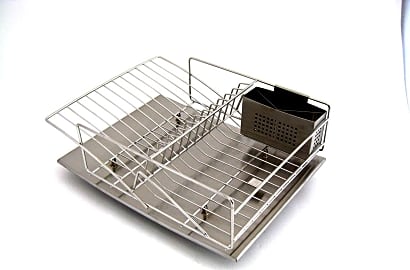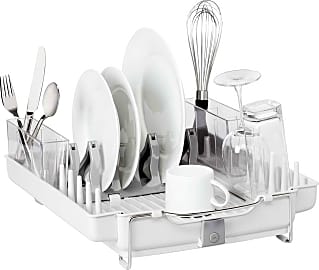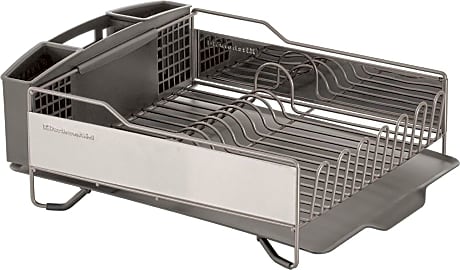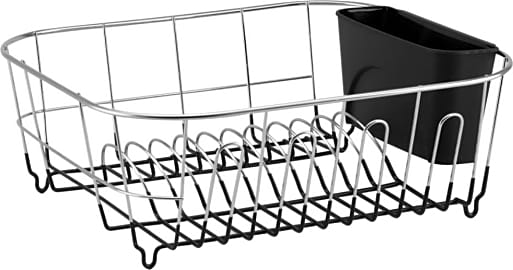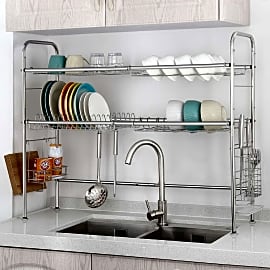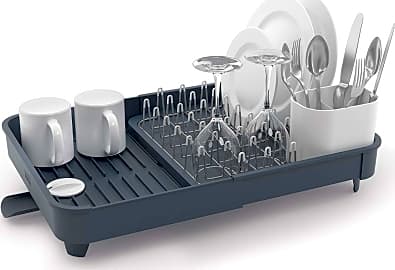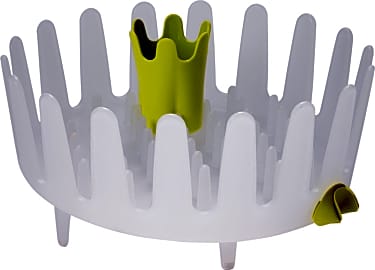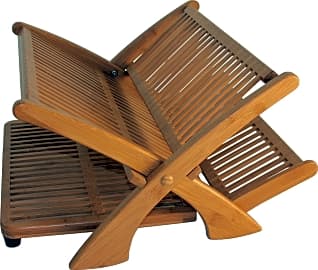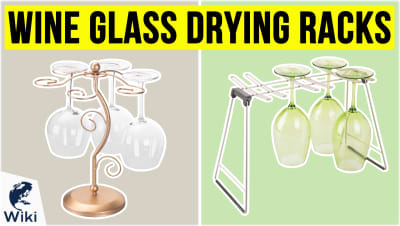The 10 Best Dish Racks

This wiki has been updated 41 times since it was first published in April of 2015. Let's face it, few people actually enjoy doing dishes, especially if you have a big family or just threw a large dinner party. However, this chore can be made a lot less painful with one of these convenient and stylish dish racks. Many are designed with handy drainage systems and feature options for accommodating mixing bowls, frying pans, plates, mugs, cutlery, and even stemware. When users buy our independently chosen editorial choices, we may earn commissions to help fund the Wiki.
Editor's Notes
May 22, 2019:
The Simplehuman Steel Frame is designed to address almost everything that's annoying about drying dishes. Its swiveling spout allows you to place it in multiple positions on the counter, the detachable rubber feet elevate it over sinks with high edges, and the wine rack and cup holders each have their own extendable drip tray. The PremiumRacks Professional can be configured to suit any type of dishes, and includes a variety of attachments for utensils, cutting boards, and more. The Nex 2-Tier takes advantage of vertical space to avoid cluttering your counter, and it can hold a lot of dishes. You can adjust the width to fit over your sink, and the lower shelf can be moved up or down to accommodate items of varying heights. If you don't have many dishes and prefer a simpler style, the Neat-O Deluxe is an inexpensive option that fits in most standard-sized sinks, but you'll have to buy a drainboard separately to use it on the counter.
It may be pricey, but the Zojila Rohan is also extremely durable and may be the last dish rack you'll ever need to buy. Its stainless steel drainboard is curved in the center and angled more sharply than others, making it one of the most effective self-draining models.
Keeping The Peace At Home
A dish drying rack has an added feature on top of its ability to rest and organize your freshly-washed dishes as they dry.
If you’ve ever lived with another human being, you know the difficulties presented by the kitchen and, more specifically, the kitchen sink. Dirty dishes are among the top causes of family and roommate disputes. I know that I’ve given serious thought to taking all my past roommate’s dirty dishes and piling them up on his bed while he's at work, just to make a valid point.
Whoever does wind up doing the dishes, he or she might not get credit for the work they’ve done if they also dry them and put them away. Doing household chores, in this sense, is a lot like breaking traffic laws. If nobody sees you do it, it never happened.
A dish drying rack has an added feature on top of its ability to rest and organize your freshly-washed dishes as they dry. It also provides an undeniable pile of evidence (for anyone who sees it) that somebody had the courtesy to wash the dishes.
If you’re reading this and thinking, “Gee, I never really notice when my spouse or my roommate hasn’t done the dishes,” then, in all likelihood, you are the one who never washes anything. Shame on you.
For the rest of us, a simple dish rack saves hours of time each week that would otherwise be spent manually drying dishes. By organizing them into one of these dish racks, the flow of air below and above the clean, wet dishes helps expedite the evaporation of any remaining water. Also, if any water collects on the base of the rack, there’s usually a slant to its construction, which allows excessive amounts of water to flow back toward the sink and down the drain, keeping you countertop dry and free of mold.
Dry Me A River
In the classic 1991 fashion comedy Don’t Tell Mom The Babysitter’s Dead, the film's female protagonist nags her reckless younger brother to do the dishes. In the following scene, we see him and his friends up on the roof of the house, skeet shooting with a shotgun, but using the dirty dishes instead of clay pigeons.
This is not a recommendable way to wash or to dry your dishes. Even without the shotgun involved, hurling dishes through the air in an attempt to increase the amount of air flowing across their surface to dry them faster will probably end in a lot of broken glass.
While you should certainly be concerned with the functionality of your dish rack, you have the opportunity to incorporate a little taste into your decision-making, as well.
If you’re looking for variety, there are some significant differences in the makeups of our top dish racks, from the way they look in your kitchen, to the way they hold their dishes, to the materials used in their design.
The more traditional dish racks on our list are simple metal frames, sometimes coated with a form of rubber to reduce scratching against sensitive dishware. They sit on top of plastic baseboards that angle toward your sink. In my opinion, these are safe choices for any kitchen, but they don’t add anything to your kitchen’s decor. At worst, they detract from it.
While you should certainly be concerned with the functionality of your dish rack, you have the opportunity to incorporate a little taste into your decision-making, as well. Take a look around your kitchen and see what the space needs. If you already have a lot of wood surfaces, bamboo cutting boards, wood cabinets, etc., then a rack like the crossed bamboo style we’ve rated here would be a great fit.
More modern-looking kitchens sporting a bit of black and stainless steel would do better paired with an equally modern dish rack, something with hard angles and a gleam of metal to it.
Whichever rack you choose, avoid the gun rack.
Finnish Doing The Dishes
Between having to wash dishes and having to dry them, if we're talking about a two-person operation here, I'll usually take the drying task. Your hands won't get as wet, and you get to move around the kitchen putting stuff away instead of being stuck in a single spot scrubbing with all your might. Still, if that second step could be avoided altogether, especially if we're talking about a one-person operation, then that's all for the better.
In my entire life, I think I've only lived in one place that had a cabinet above the sink.
The dish racks, as we see them today, have a sordid and difficult-to-track history, mainly because people have been laying their dishes out to dry since they've had dishes to wash.
The closest, traceable dish racks we can find reach back to Finland in the late 1940's. They were slightly different than the ones we've reviewed here today, mainly in that they were designed to suspend over the sink itself. That way, water runoff would fall directly into the user's sink for drainage. The problem with these, of course, is that they required one to have a cabinet of some sort installed above the sink.
In my house, currently, there is a window above our sink. In my entire life, I think I've only lived in one place that had a cabinet above the sink. Also, if you suffer from mind-splitting headaches whenever you hear the sound of water dripping into the sink from a leaky faucet, a dish rack installed a few feet above the sink itself is bound to create the same sound, a problem our sink-level racks do not have.


